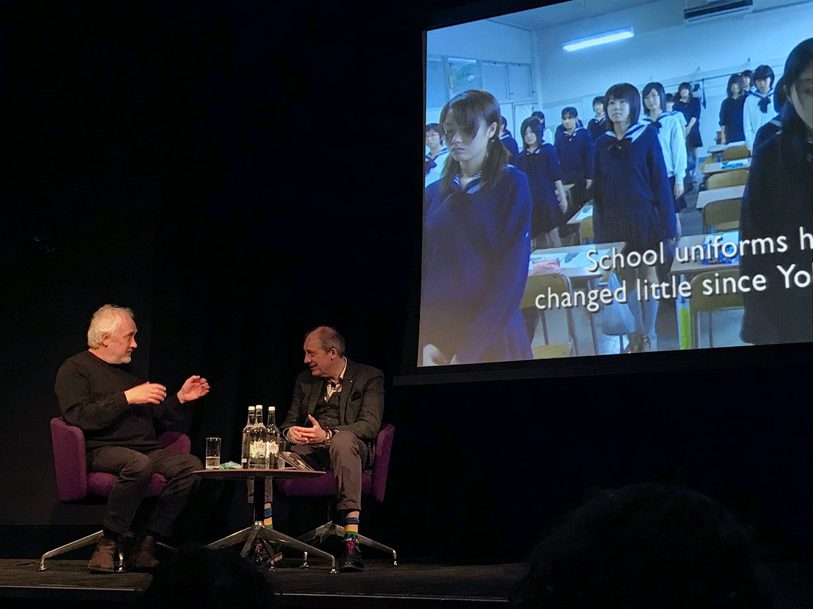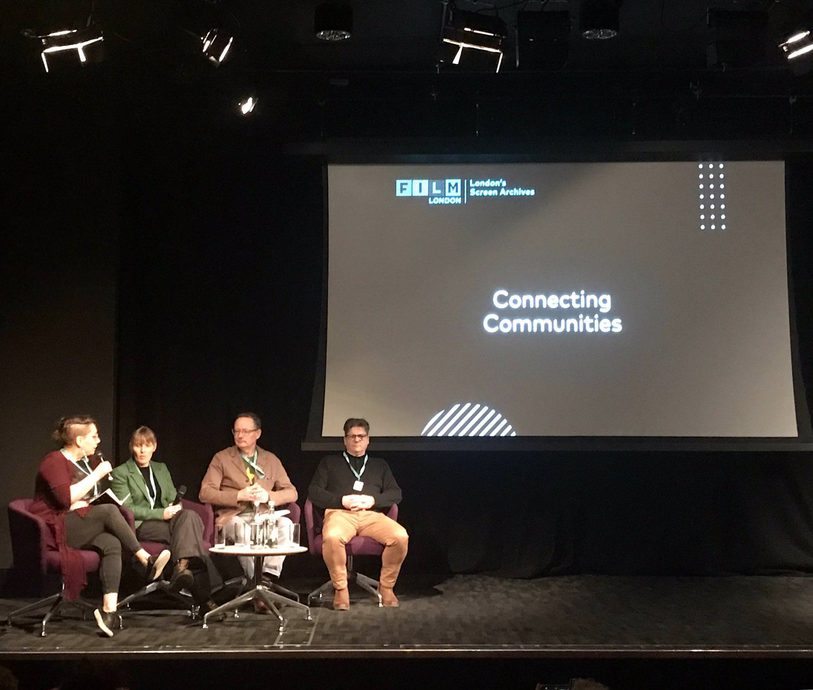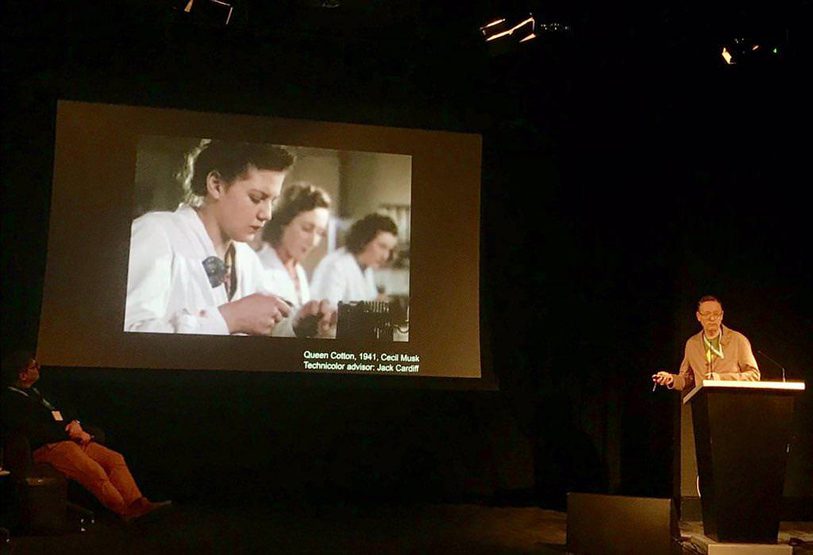News Story
London’s Screen Archives, managed by Film London, recently held the Screen Heritage conference “Future-proofing Our Collections: Unleashing the Power of Archive Film” at the Museum of London to discuss the value of archive film and its potential to bring together communities and inspire new audiences. Whether a London’s Screen Archive member, a researcher, a filmmaker, or representing a collection, it was a day filled with good practice, debate and networking to celebrate and unleash the power of archive film.
Adrian Wootton OBE, CEO of Film London and Sharon Ament, Director of the Museum of London welcomed attendees and outlined the ways in which archive film influences the screen industries; “Iconic and memorable, archive film documents our past and present, informs our debates, inspires artists and filmmakers and shapes our future”.

Adrian Wootton in conversation with Anthony Wall
A keynote from Anthony Wall, BAFTA-winning documentary filmmaker and editor of BBC’s Arts documentary strand Arena, explored the innovative use of archive in his work and the extensive BBC Archive. Touching upon its value, Wall noted that a fascination with archive film derives from the fact that it used to be thrown away but can now be re-discovered, informing and exciting audiences on history - whether this be global or local - they never thought possible to see. Wall also discussed how re-purposing archive footage can encourage new perceptions. For example, by adding music or cutting with more modern clips, a multitude of different meanings can be released from footage thought to have just one.
The London’s Screen Archives (LSA) team informed attendees about LSA’s origins, membership and milestone projects including digitisation, screenings via the KinoVan and a feature-length programme screened in cinemas. Presenting highlights from an extensive member survey as part of the National Lottery Heritage Fund supported project: LSA, Building a Resilient Network, it was revealed that priority areas for LSA members were digitisation, storage and training. The LSA team mapped out provision of these services in addition to a new membership structure going forward. Members films will be showcased on the new website.

Connecting Communities panel
In the afternoon session, delegates saw presentations and a panel discussion about how archive film could be used to bring people together through their collective history - alongside how to best engage new communities and ensure diversity.
First to present was artist filmmaker Professor Steve Hawley, discussing his archival project - ‘Talking with the Dead; the Calling Blighty films of WW2’. The Calling Blighty films were made with men gathered together in India or Burma, giving well wishes and messages to their loved ones back home. Originally screened in local cinemas to an audience of friends and relatives in order to boost morale during the war, 60 films still survive of 1200 men delivering messages home. Steve worked with the North West Film Archive to recreate many of the screenings, showing snippets of these films to our audience and explaining how the project highlights not only the struggle these men faced at the time of filming, but how he used this footage to commemorate suffering and loss today.
Next to take to the stage was Dr Clare Watson who spoke about her ongoing project, exploring British Somali cultural heritage on film. Clare’s talk focused on the potentials of community archiving, and what communities are currently more excluded from this. In particular, her work with British Somali women in Leicester highlighted the lack of archive history for this community, despite there being a long-standing Somali community within the city. Working with Media Archive for Central England, Clare created a project which enabled the Somali community to start filming footage of their lives, and search for archives that reflected their stories. One of the primary aims of this ongoing project is to develop a unique, significant and representative regional screen heritage collection - creating opportunities for this community to have a say about what is acquired or remains within a screen archive, and driving new ways to reach new and diverse audiences.
Last up on the Connecting Communities panel was Gary Thomas, film programme manager at the British Council, speaking on cultural heritage and inclusive growth. Gary focused specifically on his work with East Asia and China, and how he connected with the cultural heritage of communities in these areas to source archive footage - he also discussed the benefits that archive footage can have for communities, whilst supporting the development of archive skills in different communities across the world.

Gary Thomas, film programme manager at the British Council
Our last panel discussion of the day focused entirely on new audiences for archive film - and the potential for the use of archives in filmmaking, education, technology and reminiscence.
First up, we had Andy Robson from Film Hub North, who oversees the nationwide screen heritage fund for the BFI Film Audience Network, encouraging exhibitors to programme ambitious screenings and events that engage new audiences with archive film. In this panel, Andy focused on ways to make archive screenings part of the commonplace, regular programme schedules at cinemas - rather than viewing them as specialist, or one-off events.
Following this, Dr Shane O’ Sullivan, senior lecturer at Kingston School of Art spoke about the use of archive in education, and the need for accessibility. Whilst the UK has a rich tradition of filmmakers working with the archive, the footage is not always accessible to particular groups - Shane pressed for the responsible sharing of cultural heritage, whilst keeping the importance of protecting copyright. In his work with students, Shane highlighted that the creative re-use of publicly owned material allowed young filmmakers to reactivate fragments of our cultural history, and connect them to lives today.
Next, we had Jake Berger from the BBC Archive editorial team, who spoke about RemArc - their online reminiscence tool for those with dementia, encompassing footage from the 1930s to 2000s. This tool is used to help assist people who have dementia, by stimulating long-term memory with material from the past - improving the quality of life for them and their families, friends and carers. You can access RemArc for yourself via the website.
Our final presentation of the day came from Esther Johnson, who talked us through her film Asunder - an archive film on Sunderland & the North East’s relationship with WW1 and the Somme. Asunder used archive footage from this time to focus on stories less told during WW1 - finding moments of magic within the horrors through personal moments and specific stories from the home front.
We’d like to thank all of our speakers for a lively and inspiring day of learning, and our partners and sponsors: The National Lottery Heritage Fund, Museum of London, Digital Vision, R3EL and R3Store Studios, for supporting this event.